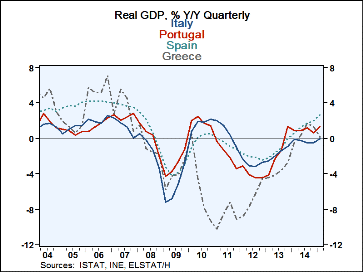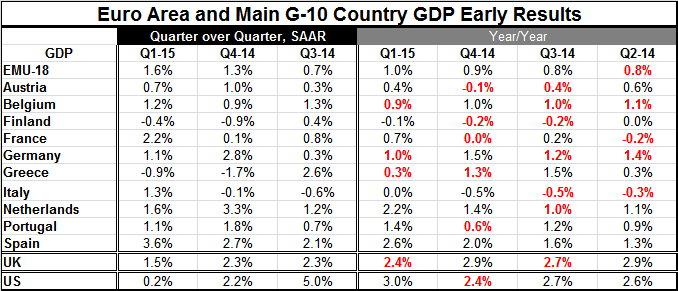 Global| May 13 2015
Global| May 13 2015European Growth Steps Up...Small Step
Summary
EMU GDP accelerated in Q1 2015 with growth rising to an annual rate of 1.6%, up from 1.3% in Q4 2014. It's not much of a pickup, but it is acceleration. Among the early reporters of GDP in Q1 2015, only two, Finland and Greece, have [...]
 EMU GDP accelerated in Q1 2015 with growth rising to an annual rate of 1.6%, up from 1.3% in Q4 2014. It's not much of a pickup, but it is acceleration. Among the early reporters of GDP in Q1 2015, only two, Finland and Greece, have posted declines in GDP. These are the same two countries that posted declines in Q4 2014. However, Greece is still seeing substantial declines in quarterly GDP growth while Finland's declines have been more muted.
EMU GDP accelerated in Q1 2015 with growth rising to an annual rate of 1.6%, up from 1.3% in Q4 2014. It's not much of a pickup, but it is acceleration. Among the early reporters of GDP in Q1 2015, only two, Finland and Greece, have posted declines in GDP. These are the same two countries that posted declines in Q4 2014. However, Greece is still seeing substantial declines in quarterly GDP growth while Finland's declines have been more muted.
Turning to annual growth rates, the EMU pickup remains quite small. Over four quarters, GDP is up by 1% compared to a rise of 0.9% last quarter and 0.8 % in the two quarters before that. While there is still a technical acceleration here, the region is basically growing at the same pace over the last four quarters.
Of the 11 early reporting countries five have GDP either decelerating or still falling year-over-year or flat. GDP is falling in Finland; it is decelerating in Belgium, Germany and Greece; and it is flat year-over-year in Italy. Year-over-year GDP growth is in excess of 2% only in Portugal and Spain. In the previous three quarters, there were six countries in these categories each quarter.
There is still a lot of weakness in Europe. Among reporting EMU members, only two have growth in excess of 2% year-over-year and one, Spain, has hit 2% or more for two quarters in a row.
The large EMU economics are not leading the way. Much of the progress has come because of improvement in the austerity countries. As for the big four economics, Germany has slowed in Q1. France has picked up but after a long period of weakness and frankly it has done so without the supporting data showing improvement to make its GDP pop in Q1 seem like it will last. Italy improved in Q1 by ramping its GDP growth up to zero after a string of declines. Spain of course is the real success story with four solid quarters of growth.
The U.K. has been more solid than EMU members. It has year-over-year growth rates of 2%-plus for six straight quarters. The U.S. has performed about the same. While we can complain about weak global growth in general, the EMU is clearly one of the real soft spots.
The early use of QE seems to have helped the U.S. and the U.K. move ahead. The EMU seems to be having some success with its round of QE, but it has started it with rates so low its QE may prove to be a very expensive endeavor- and it is far too soon to judge it.
Europe still has a lot of weakness. While the overall EMU growth rate is higher, it should be clear that challenges remain. And now there are both Greece and Finland with two consecutive quarters of negative growth flirting with recession. And Greece of course is trying to cut a new deal with the euro group. Conditions in Europe remain difficult despite today's somewhat upbeat report.

Robert Brusca
AuthorMore in Author Profile »Robert A. Brusca is Chief Economist of Fact and Opinion Economics, a consulting firm he founded in Manhattan. He has been an economist on Wall Street for over 25 years. He has visited central banking and large institutional clients in over 30 countries in his career as an economist. Mr. Brusca was a Divisional Research Chief at the Federal Reserve Bank of NY (Chief of the International Financial markets Division), a Fed Watcher at Irving Trust and Chief Economist at Nikko Securities International. He is widely quoted and appears in various media. Mr. Brusca holds an MA and Ph.D. in economics from Michigan State University and a BA in Economics from the University of Michigan. His research pursues his strong interests in non aligned policy economics as well as international economics. FAO Economics’ research targets investors to assist them in making better investment decisions in stocks, bonds and in a variety of international assets. The company does not manage money and has no conflicts in giving economic advice.
More Economy in Brief
 Global| Feb 05 2026
Global| Feb 05 2026Charts of the Week: Balanced Policy, Resilient Data and AI Narratives
by:Andrew Cates






